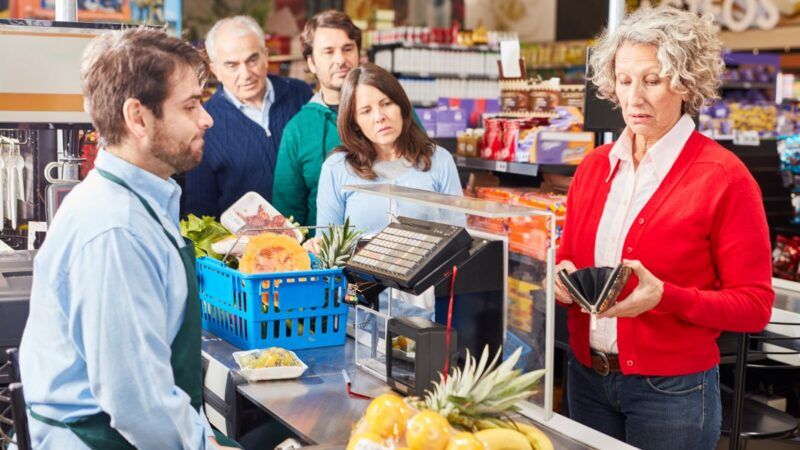Government Officials Hunger for More Revenue Through Food Taxes
Inflation isn't the only reason some folks may be paying more for dining and groceries.

At a time of rising food inflation, food taxes are increasingly in the news. And while some cities and states have seen fit to reject taxes on foods sold by grocers or restaurants, others are going in exactly the wrong direction.
Food taxes have made headlines recently in Minnesota, Oregon, Utah, and Kansas. In Sartell, Minnesota, for example, residents will vote in a special election in February that will determine whether the city will impose a tax on foods sold by restaurants and bars there.
A pair of similar votes took place in Oregon this month, with mixed results. Last week, voters in Newport, Oregon, rejected a proposed five-percent tax on prepared foods and beverages sold by restaurants and bars. Supporters claimed the proposed tax would have added more than $2 million to city coffers in its first year.
While Newport's mayor had touted the tax as a way to address an "impending structural deficit," the city had proposed to use the money to hire new staff, including a parking-enforcement officer, and to spend around $200,000 "for one-time grants to assist businesses in implementing collection of the new tax."
Opponents, on the other hand, explained why the proposed tax was unfair—citing everything from the impact of food inflation on residents' abilities to feed themselves and their families to the effects of COVID-19 and related restrictions on the restaurant industry, which is struggling still to recover.
"No industry was more negatively impacted by COVID-19 than the hospitality industry," Mike Franklin, owner of Newport Chowder Bowl, told the Newport News before last week's vote.
"Massive layoffs of employees, complete shutdowns or limited hours of operation, limits on indoor dining and increased prices or shortages from suppliers have all contributed to devastate the restaurant industry."
In Cannon Beach, a couple hours up the Oregon coast from Newport, voters chose to adopt a similar 5 percent food tax by a narrow 52-48 margin. Funds raised from the tax will be used to build a new city hall and police department offices.
Before the vote, Shelly Crane, who owns local business Oil and Vinegar Bar and opposed the measure, questioned both the tax and how funds raised by it would be allocated.
"Do we need a new city hall, probably[. D]o we need it now? No," Crane told the Cannon Beach Gazette. "The timing of this is horrible, they are not thinking what affect this will have on restaurants. We have all been hit hard due to the pandemic."
While Oregon municipalities went in different directions on restaurant food taxes, in neighboring Utah, lawmakers are considering abolishing that state's grocery food tax altogether.
According to the Center for Budget and Policy Priorities (CBPP), a nonpartisan group in Washington, D.C. that opposes food taxes, Utah is one of 13 states that taxes residents' grocery purchases. State Rep. Rosemary Lesser (D–Ogden), who's pushing to repeal the state's food tax, said she's worried about the regressive nature of such taxes.
"For people who are living paycheck to paycheck, the food demands don't change, and people sometimes have to choose between a roof over their head and finding food from whatever sources they can," she told Utah Public Radio last month. In a separate op-ed last month, State Rep. Lesser also noted that a food tax "disproportionately hurts low-income Utahns and contributes to food insecurity."
In Kansas, similar arguments have been raised as part of efforts to repeal or reduce that state's food tax. And it's also become a campaign issue in the state's looming gubernatorial race.
While current Democratic Kansas Gov. Laura Kelly campaigned in 2018 on a promise to cut the state's food tax, the current leading GOP candidate for the state's top job, Kansas Attorney General Derek Schmidt, said last week, in remarks reported the Topeka Capital-Journal, that Gov. Kelly has dropped the ball on repealing or reducing the state's food tax, which the CBPP says is the nation's second-highest, after Mississippi's.
"This issue has had bipartisan support since long before Laura Kelly was governor," Schmidt said. "It's true that then-candidate Kelly campaigned on this in 2018, and it's also true that three years into her administration she has completely failed to deliver on that promise."
Food has long been a popular target for those seeking to squeeze more tax dollars out of consumers. "The same factors that make food taxes so attractive to lawmakers are what make them so odious to many consumers: they're all-but-impossible to avoid," I opined in a 2017 column. "Everyone buys food; food taxes punish everyone who buys food."
As I've also noted, when governments claim higher food taxes somehow won't impact prices paid by consumers, critics who disagree are inevitably proven correct. When food prices are sky high and countless restaurants are struggling to survive—both the case today—food taxes are particularly unjust and unwelcome. That's why any discussion of food taxes today must focus on the need to reduce or eliminate them altogether.


Show Comments (305)